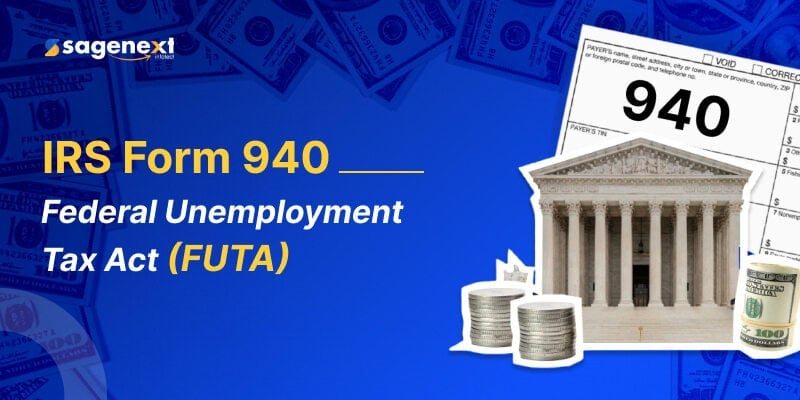
What is IRS Form 940? A Complete Guide to Filing It and Other Details
Firms and businesses have greater tax responsibilities than merely paying income taxes. Form 940, which reports the Federal Unemployment Tax (FUTA), is an important payroll tax form that companies should be familiar with. This form is used to assist in paying unemployment compensation to staff and workers who lose their jobs. However, it is not mandatory for all businesses and firms to submit it. This article will explain Form 940, including what it is, who must file it, how to fill it out, and where to send it to the IRS.
What is IRS Form 940?
Federal Unemployment Tax Act (FUTA) taxes are reported annually by employers using IRS Form 940. This tax is primarily paid by employers and businesses and is intended to provide a source of funding for unemployment compensation. While most states need separate state-level unemployment contributions, Form 940 solely applies to federal requirements. To put in briefly, Form 940 is essential for enterprises and businesses that have employees and are required to contribute to the federal unemployment insurance program.
Is Filing Form 940 Mandatory for All Businesses?
No, all businesses are not mandated to submit Form 940. Employers are required to submit only if they paid wages of $1,500 or more in any calendar quarter or employed at least one individual for 20 or more weeks in the current or preceding year. Furthermore, FUTA taxes apply just to the initial $7,000 of each employee’s annual wages.
Who Can Avoid Filing Form 940?
Specific groups of employers are free from FUTA tax and are not required to submit Form 940, including:
Governmental organizations (such as federal, state, and local government agencies)
- Non Profit organizations that are typically exempt from federal unemployment taxes
- Household employers (though some household employers may need to file Form 940 in specific circumstances)
- Sole Proprietors: Sole proprietors without staff do not need to file Form 940. However, this form must be filed by them if they hire employees who fulfill the wage or hour limits.
Form 940 Instructions and How to Fill It Out
Completing Form 940 may seem challenging, but with the right steps, it can be straightforward. Here’s a step-by-step guide to ensure accurate reporting:
- Basic Business Information: At the top of Form 940, fill in your business’s Employer Identification Number (EIN), name, and address. Double-check these details as errors here can lead to delays in processing.
- Determine FUTA Liability:
- Calculate your total payments to employees.
- Deduct any exempt payments (such as fringe benefits, group-term life insurance, and retirement plan contributions).
- After exemptions, calculate the FUTA tax on the first $7,000 of each employee’s wages. The standard FUTA rate is 6%, though credits can reduce this rate if state unemployment taxes were paid.
- Calculating Adjustments:
- Adjust for any state unemployment tax credits. Generally, employers receive up to a 5.4% credit if they paid timely state unemployment taxes, reducing the effective FUTA tax rate to 0.6%.
- Tax Computation:
- Use Part 3 of the form to complete calculations on the total tax due after credits. If you paid state unemployment tax on time, you likely only need to pay 0.6% of the first $7,000 of each employee’s wages.
- Make Deposits:
- Employers owing over $500 in FUTA tax for the year must make quarterly payments. For smaller amounts (less than $500), you can pay when filing the form.
- Finalizing Form 940:
- In Part 5, calculate the balance due or any overpayment.
- If you have overpaid, you can request a refund or apply the overpayment to the next tax year.
- Sign and Date:
- Ensure that an authorized individual signs and dates the form. Unsigned forms may be returned, causing potential delays or penalties.
Where to Mail Form 940
Depending on your state and whether you are enclosing a payment or not, there are different mailing addresses for Form 940. The latest mailing addresses can be verified and checked on the IRS website. For speedier processing and confirmation, the IRS strongly recommends electronic filing.
Form 940: Filing Deadlines
Form 940 must be submitted to the IRS by January 31st of each year. The deadline for filing is extended to February 10th if FUTA taxes are deposited on time. For FUTA tax liabilities over $500, quarterly deposits are required. Liabilities less than $500 can be carried over to the next quarter.
Conclusion
The process of navigating one’s tax obligations can be difficult, particularly when dealing with forms such as the IRS Form 940. It is possible to assure compliance and avoid penalties by first gaining an understanding of the objective of the form, then determining whether or not it relates to your company, and finally following the correct filing instructions. It is important to keep in mind that if you are unsure about any aspect of the FUTA tax or Form 940, it is always a good idea to check with a tax specialist or an accountant.
Important Links To Access
- For Detailed Instructions To Fill form 940, Click on the Link – https://www.irs.gov/instructions/i940
- To Download Form 940 for 2023 Directly From IRS Website, Click on the link – https://www.irs.gov/pub/irs-pdf/f940.pdf
FAQ
What is Form 940 for?
The Federal Unemployment Tax (FUTA) for employees is reported and paid using Form 940. Employers alone must pay this tax, which is used to provide unemployment compensation.
Does everyone have to file a Form 940?
All firms are not required to submit Form 940. Employers must submit if they paid $1,500 or more in any calendar quarter or employed at least one person for 20 weeks in the current or previous year.
Do non profits file 940 or 941?
Nonprofits generally need to file Form 941 to report quarterly federal income tax, Social Security, and Medicare taxes withheld from employees’ wages, as well as the employer’s share of these taxes. However, they typically do not file Form 940, as nonprofit organizations are usually exempt from Federal Unemployment Tax Act (FUTA) taxes.
Do sole proprietors need to file Form 940?
Exemptions are granted to sole proprietors who do not have any workers. However, they are responsible for filing if they satisfy the wage or hour requirements of an employee.
Who is exempt from filing Form 940?
Government entities, nonprofits, and some household employers are generally exempt from filing Form 940.
 written by
written byAbout Author






